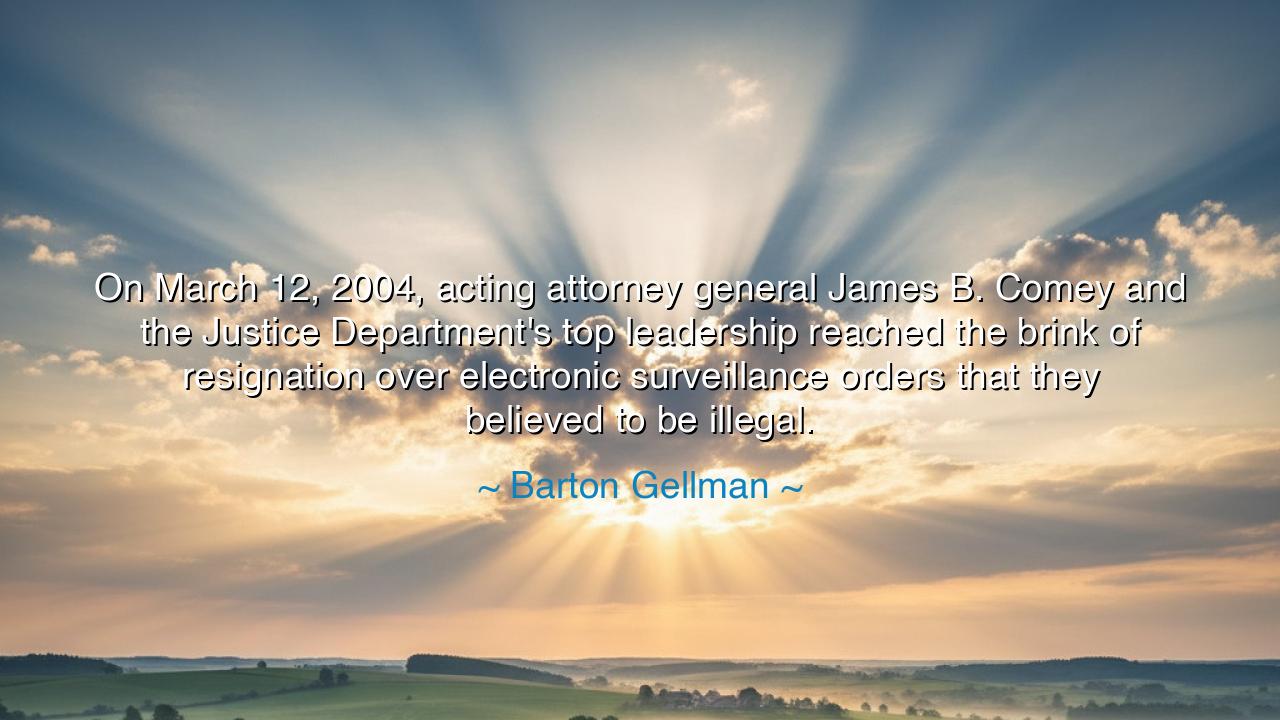
On March 12, 2004, acting attorney general James B. Comey and the
On March 12, 2004, acting attorney general James B. Comey and the Justice Department's top leadership reached the brink of resignation over electronic surveillance orders that they believed to be illegal.






Hear, O keepers of justice, the words recorded by Barton Gellman, who declared: “On March 12, 2004, acting attorney general James B. Comey and the Justice Department's leadership reached the brink of resignation over electronic surveillance orders that they believed to be illegal.” In this solemn account lies a tale not of weapons or armies, but of principle, of men and women who stood at the edge of defiance, ready to cast away high office rather than betray the law. For here we see the eternal struggle between power and conscience, between the demands of rulers and the duties of justice.
The origin of this story lies in the shadow of September 11, when fear and urgency pushed governments to seek safety by any means. In such times, the temptation is great to stretch the law, to bend it until it nearly breaks, in the name of security. Yet those entrusted with justice knew that to protect the nation by unlawful means is to hollow out the very freedom one seeks to defend. Thus Comey and his colleagues stood against orders of surveillance that, though cloaked in necessity, were judged by their conscience to be against the rule of law.
Think of the courage it required. For these were not rebels in the street, but officials of the highest rank, loyal servants of the state. To resign in protest would shake the foundations of government, and yet they were ready. This moment was their test: whether to bow before the immense pressure of power, or to remain faithful to the principle that no man, no ruler, no cause, is above the law. Their near-resignation stands as a beacon, showing that even in the halls of authority, integrity must prevail over obedience.
History echoes with similar moments. Recall Thomas More, who refused to sign the oath affirming Henry VIII as head of the church. He was not against his king, but he would not betray his conscience or the law of God. For this he paid with his life, yet he became immortal as a symbol of fidelity to principle over power. In the same way, the officials of March 2004 nearly laid down their careers, proving that honor is worth more than position, and truth more than title.
The meaning of Gellman’s words is profound: the true test of leadership is not how one acts in ease, but how one stands in crisis, when the path of comfort leads one way and the path of conscience leads another. To obey unlawful commands is to enslave the law; to resist them, even at great cost, is to keep the flame of liberty alive. Such was the choice faced by Comey and his fellows, and by their defiance they preserved not only their honor but the principle that justice must be bound by law, not by fear.
The lesson, O listener, is for all generations: do not think that integrity is tested only on battlefields. It is tested in offices, in courts, in the silent moments when a signature may betray justice or uphold it. Each of us will face times when power commands one thing and conscience another. Then remember: to yield may bring ease, but to stand firm brings truth. And truth, though it may cost much, outlives every throne.
Practical action lies before you: cultivate courage in small things, so that you may stand firm in greater trials. Learn the laws, honor the truth, and do not be swayed by the seduction of fear or favor. Support leaders who honor principle over convenience, and if you are called to choose, choose the path of integrity, even if it leads to sacrifice. For this is the way of all who would keep the flame of justice alive in the darkness.
Thus let Barton Gellman’s record be remembered: that on a day in March, when power sought to push past the boundaries of law, there were those who stood ready to fall rather than to yield. Their example is a testament to the eternal truth: that the law must govern power, and that leadership, if it is worthy, must always bow to conscience before it bows to command.






AAdministratorAdministrator
Welcome, honored guests. Please leave a comment, we will respond soon